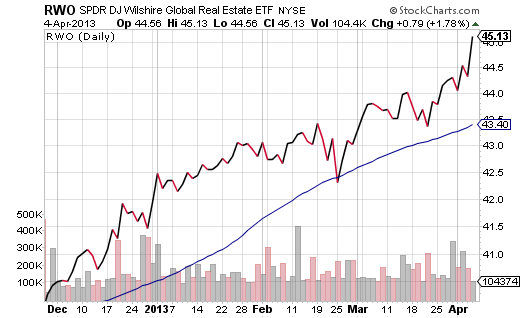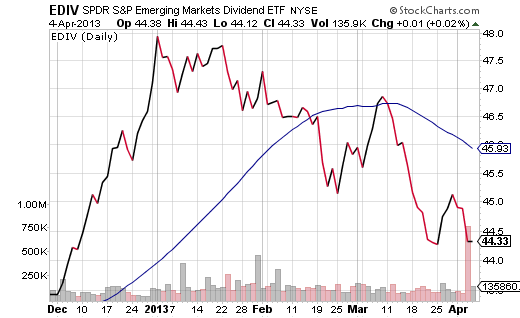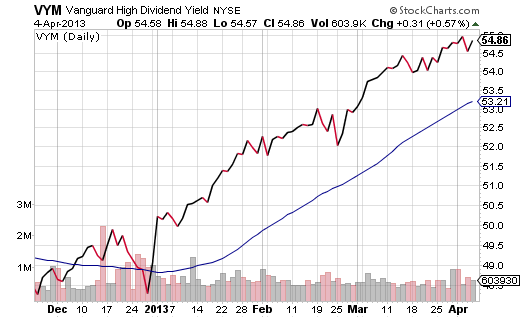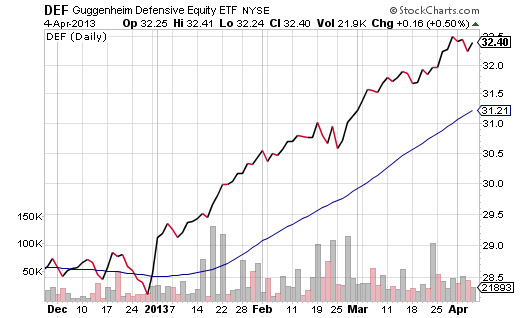Here in the first week of April of 2013, an overwhelming number of folks believe one truth to be unassailable. For worse or for better, the U.S. Federal Reserve’s unconventional interest rate easing has pushed dollars into riskier assets, including higher-yielding debt, equities and real estate.
Beyond crediting the Fed with a modern-day “wealth effect,” however, opinions vary greatly. Some expect that the U.S. Federal Reserve’s electronic money creation and subsequent bond purchasing will continue for many years into the future. Others postulate that the Fed may signal a change in direction as early as June or July. Similarly, there are those who feel that the end of ultra-loose monetary policy will mark the start of a self-sustaining economy — one where stocks and other higher-yielding assets will continue providing ample reward for the risk incurred. Conversely, there are many who argue that the minute the Fed ceases to intervene, these types of assets will drop like boulders off the proverbial precipice.
Granted, without a reasonable return on cash to be found, institutional investors (e.g., insurance companies, hedge funds, money managers, etc.) may find themselves craving more appealing alternatives. On the other hand, big money can head for the exit doors just as quickly as it had entered. Profit-taking after months of unrestrained gains can knock the wind out of a market’s sails. Even a series of less-than-glorious economic reports can put a dent in the idea that the Fed can cure all portfolio ills.
For example, while it has not been widely reported, roughly 3/4 of S&P 500 corporations have issued negative guidance going into the Q1 earnings season. They’re likely to blame their “misses” on the ongoing eurozone recession and/or sequestration. Meanwhile, manufacturing growth in the U.S. continues to slow, as the “Purchasing Managers Index (PMI)” dipped to 51.3 from 54.3 in March.
Maybe the Fed can solve everything with easy money for home and auto purchases. Still, rotating away from sexier growth assets and into less glamorous defensive equities makes more sense to me. Here are 3 shifts worth of making:
1. Shift From High Beta Real Estate to Less Volatile Real Estate Investment Trusts. For the better part of 2012, investors in iShares DJ Home Construction (ITB) and SPDR Homebuilders (XHB) may have seemed prescient. Year-over-year, one’s looking at 55% and 35% gains respectively. Nevertheless, the risks here are beginning to outweigh the rewards. A safer way to benefit from large company profits in residential, office and retail real estate is through the higher yielding REITs. Consider Vanguard REIT (VNQ) or SPDR Global Real Estate (RWO) on a pullback near a 50-day moving average.
2. Shift From Foreign Dividend Names To Domestic Dividend Producers. In theory, I like emerging market dividends. In reality, however, the high profile names in the emerging market dividend space are not providing value at this time. Shifting away from funds like WisdomTree Emerging Market High Yielding Equity (DEM) and SPDR Emerging Market Dividend (EDIV) makes sense when current prices are notching lower lows.
Are there less volatile, higher-octane funds worthy of rotating into? Yes, one should consider U.S. dividend stalwarts like WisdomTree 100 (DTN), iShares High Dividend Equity (HDV) and Vanguard High Yield (VYM). That said, I’d be inclined to wait for a 4% pullback in the broader U.S. markets (e.g., S&P 500) before making that allocation. (Note: Cash is not “trash” when you are exercising discipline and patience.)
3. Shift From High Beta Aggressive Sectors To Low Beta Defensive Segments. When an economy is humming on all cylinders, sector leadership is usually concentrated in the high beta cyclicals like tech and energy. Yet some of the most attractive assets in the tech and energy spaces, like First Trust Internet (FDN) and SPDR Select Energy (XLE), have crossed below key support levels. In contrast, significant defensive ETFs like Guggenheim Defensive Equity (DEF) and WisdomTree Equity Income (DHS) focus on safer sectors like consumer staples and health care.
Once again, one does not need to sell and replace on the exact same day. When you rotate out of a more aggressive ETF, you can wait in cash for an inevitable pullback before redeploying into a new ETF.
Disclosure: Gary Gordon, MS, CFP is the president of Pacific Park Financial, Inc., a Registered Investment Adviser with the SEC. Gary Gordon, Pacific Park Financial, Inc, and/or its clients may hold positions in the ETFs, mutual funds, and/or any investment asset mentioned above. The commentary does not constitute individualized investment advice. The opinions offered herein are not personalized recommendations to buy, sell or hold securities. At times, issuers of exchange-traded products compensate Pacific Park Financial, Inc. or its subsidiaries for advertising at the ETF Expert web site. ETF Expert content is created independently of any advertising relationships.
- English (UK)
- English (India)
- English (Canada)
- English (Australia)
- English (South Africa)
- English (Philippines)
- English (Nigeria)
- Deutsch
- Español (España)
- Español (México)
- Français
- Italiano
- Nederlands
- Português (Portugal)
- Polski
- Português (Brasil)
- Русский
- Türkçe
- العربية
- Ελληνικά
- Svenska
- Suomi
- עברית
- 日本語
- 한국어
- 简体中文
- 繁體中文
- Bahasa Indonesia
- Bahasa Melayu
- ไทย
- Tiếng Việt
- हिंदी
Time To Rotate Your ETF Positions
Published 04/05/2013, 01:21 AM
Time To Rotate Your ETF Positions
Latest comments
Loading next article…
Install Our App
Risk Disclosure: Trading in financial instruments and/or cryptocurrencies involves high risks including the risk of losing some, or all, of your investment amount, and may not be suitable for all investors. Prices of cryptocurrencies are extremely volatile and may be affected by external factors such as financial, regulatory or political events. Trading on margin increases the financial risks.
Before deciding to trade in financial instrument or cryptocurrencies you should be fully informed of the risks and costs associated with trading the financial markets, carefully consider your investment objectives, level of experience, and risk appetite, and seek professional advice where needed.
Fusion Media would like to remind you that the data contained in this website is not necessarily real-time nor accurate. The data and prices on the website are not necessarily provided by any market or exchange, but may be provided by market makers, and so prices may not be accurate and may differ from the actual price at any given market, meaning prices are indicative and not appropriate for trading purposes. Fusion Media and any provider of the data contained in this website will not accept liability for any loss or damage as a result of your trading, or your reliance on the information contained within this website.
It is prohibited to use, store, reproduce, display, modify, transmit or distribute the data contained in this website without the explicit prior written permission of Fusion Media and/or the data provider. All intellectual property rights are reserved by the providers and/or the exchange providing the data contained in this website.
Fusion Media may be compensated by the advertisers that appear on the website, based on your interaction with the advertisements or advertisers.
Before deciding to trade in financial instrument or cryptocurrencies you should be fully informed of the risks and costs associated with trading the financial markets, carefully consider your investment objectives, level of experience, and risk appetite, and seek professional advice where needed.
Fusion Media would like to remind you that the data contained in this website is not necessarily real-time nor accurate. The data and prices on the website are not necessarily provided by any market or exchange, but may be provided by market makers, and so prices may not be accurate and may differ from the actual price at any given market, meaning prices are indicative and not appropriate for trading purposes. Fusion Media and any provider of the data contained in this website will not accept liability for any loss or damage as a result of your trading, or your reliance on the information contained within this website.
It is prohibited to use, store, reproduce, display, modify, transmit or distribute the data contained in this website without the explicit prior written permission of Fusion Media and/or the data provider. All intellectual property rights are reserved by the providers and/or the exchange providing the data contained in this website.
Fusion Media may be compensated by the advertisers that appear on the website, based on your interaction with the advertisements or advertisers.
© 2007-2025 - Fusion Media Limited. All Rights Reserved.
